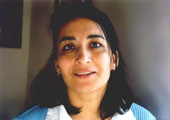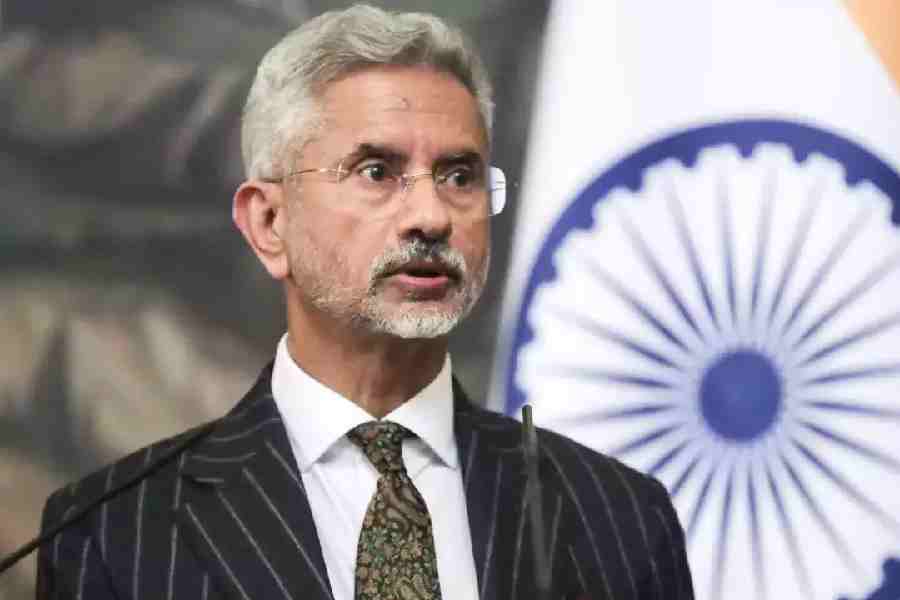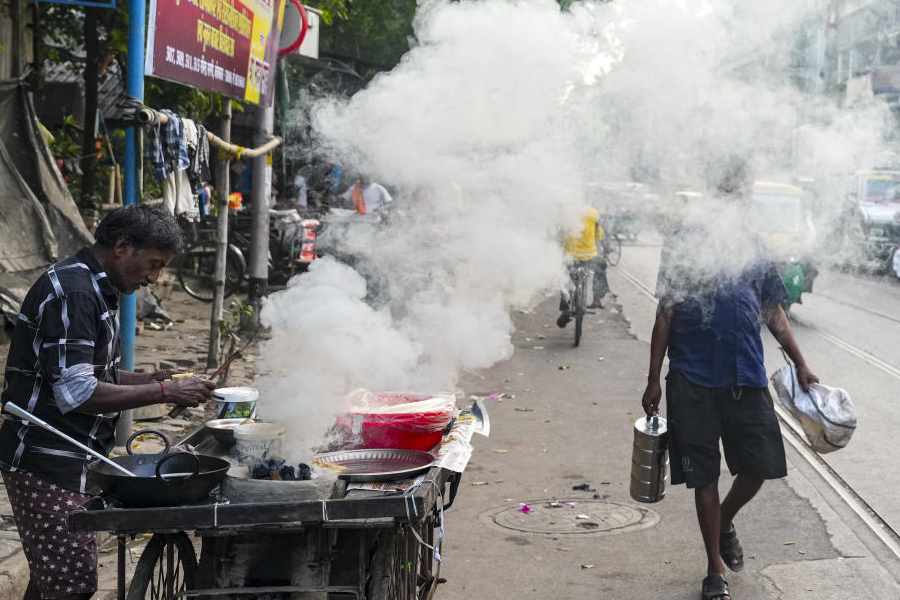 |
 |
| Rhythm divine: Asra Nomani (top); her book (above); a tantric painting (below) |
 |
Sex is a subject on which Asra Nomani has become something of an authority, not least because she has written a bestselling book in America on tantra. “At the end of the day everyone, everywhere in the world, is looking for love — and better sex,” says Asra. This quest isn’t uniquely American, she adds. “What’s uniquely American is that there is a business of selling this in workshops and hotel ballrooms and forest retreats.”
She is referring to tantra, which has taken over in the last five years from yoga, gyms, going for the burn and flower power as America’s latest fad. Tantra workshops and tantrika teachers have sprung up all over the United States, typically charging $300 for a weekend. “It was basically to teach how to have better sex, ‘divine’ sex,” she reveals.
What began as a newspaper article when Asra was a reporter on the Wall Street Journal grew into a book, and the book turned into a searingly honest exploration of human sexuality, including, it has to be said, her own.
Asra, who was born into an orthodox Muslim family in Mumbai on June 7, 1965, “in Noor Hospital on Mohammed Ali Road”, does not hide the fact she has been through a “string of bad relationships” with several boyfriends (“I definitely did not have hang-ups about sexuality”), a marriage to a Pakistani which lasted all of three months, and, most recently, a passionate love affair with another Pakistani (“I was totally in love with him”) which has left her an unmarried mother with a baby son, Shibli, who was born on October 16, 2002.
Her son, who has transformed her life, has been named after her ancestor, Maulana Shibli Nomani (1857-1914), one of the revered scholars of Lucknow. Asra herself hit the headlines in January, 2002, when her friend and colleague, Daniel Pearl, who was living in her rented house in Karachi, was kidnapped and murdered.
Though her friend’s killing merits a chapter at the end of her book, Tantrika: Traveling the Road of Divine Love (HarperSanFrancisco; $24.95) — Asra will shortly be in India to mark its publication by HarperCollins India — begins in 1969 when a four-year-old girl journeys to the United States with her parents, Zafar and Sajida Nomani, and her six-year-old brother.
Asra grew up in Morgantown, a small town in West Virginia where her father recently retired as a professor of nutrition. Like so many Indian girls in the West, Asra confides she lost her virginity at 19 — she would get her boyfriends to drop her off a block away from home so that she could pretend to her parents she had been studying at the “library”.
In time, she left home and landed a job as a reporter with the Wall Street Journal, America’s premier financial daily where — she isn’t sure how this happened — she became known as the paper’s unofficial “sex reporter”. “I was drawn to trying to understand the power of sex and sexuality in our culture,” she comments.
Asra and I are talking at the joint family establishment in Morgantown, where she is bringing up her son with the full support of her remarkable parents. She says she is grateful they are “not judgmental”. Outside, the temperature is -10°C, and the snow-covered ground slopes away from her bungalow on the top of a hill to a forest of bare branches.
For the Wall Street Journal, she goes on, she had written about the “changing attitude of couples to their wedding night”. “So many people live with their boyfriends or girlfriends and so the wedding night is actually when they can hang out with their friends,” she says.
Another investigation, conducted while covering the airline industry, was into the “Mile High club”. “It had become such a safety hazard for flight attendants and pilots because folks were trying to have sex on airplanes,” she explains. “They were locking themselves in lavatories, so much so that Singapore Airlines talked about it at an air safety symposium in Hong Kong.”
Since the motto on the Wall Street Journal was “follow the money”, she wasn’t surprised when one day, a page-one editor, Ken Wells, gave her an assignment: “Go find Mr and Mrs Tantra.”
With a smile, Asra admits: “I didn’t even know what tantra meant.” A quick search on the Internet revealed a flourishing business in “tantra workshops, tantric massage oil, tantric books, tantric feathers”.
Asra flew to a tantra workshop in Canada and then discovered “Mr and Mrs Tantra” in Santa Cruz, California. “The couple, Caroline and Charles Moore, made a killing selling off spot massage homework to Americans,” she laughs.
She uncovered a parallel universe of chakras, mantras, kundalinis, dakini workshops, all at a price, of course. American women teachers born, say Deborah, reinvented themselves “with fake Hindu names like Kali and Shakti”.
Encouraged by her colleagues, the news report evolved into a book. Instructed by her literary agent to “tap into her Indian roots”, Asra took off for India. After three exhilarating trips, involving much adventure, many ups and downs, lots of tears and a physical injury, travels in Kathmandu and along the Indo-Chinese border, a hair-raising motorcycle dash from Delhi to Dharamshala to see the Dalai Lama, visits to Pondicherry and the Andaman & Nicobar Islands, a dip at the Maha Kumbh Mela, a splash in the Bay of Bengal, a stay at Latif Mahal in her ancestral UP village of Jaigahan and many encounters with “amazing women”, we have Asra’s highly entertaining and yet strangely profound and moving book.
There is self-knowledge, the realisation of her deeper identity and an understanding of the power of sex. She is relieved she held out against an abortion, as her last boyfriend (generously unidentified in the book) had urged. “I find love through my son,” she concludes.
“Maternal love is ultimately the purest form of love. It is completely giving and you have complete surrender. These are concepts which would be wonderful in love between a man and a woman but we have so many human emotions to overcome, of jealousy and insecurity, but with a baby it’s unconditional. I, too, have known it through my parents.”
She wishes she had been honest with her parents during her growing up years. Equally, she feels “parents have to do some fast growing up in terms of dealing truthfully with the realities of their kids’ lives,” she remarks.
Tantra, she now realises, isn’t essentially about better sex, “but about overcoming fear, liberating yourself from boundaries of religion and gender. It’s about the power of a woman, very basically shakti.”
If there is one thing she has learnt, it is to be honest about sex. “Otherwise you live a lie,” she points out. “That’s what so many of us do because we cannot speak truthfully about the most intimate parts of our lives which are ultimately the most important.”











